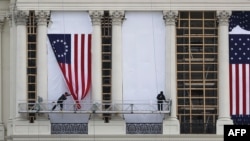In his farewell speech, outgoing US President Barack Obama reiterated his commitment to ensuring the “smoothest possible” transfer of power to President-elect Donald Trump, as George W. Bush had done for him in 2009.
This peaceful transition honors a tradition of democracy that has been adhered to by presidents throughout the nation’s 240-year history.
Many Cambodian-Americans whose families came to the US more than 40 years ago, fleeing civil war and killing fields, believe there are lessons for Cambodia to learn from this legacy of democracy as its own 2018 national elections near.
In the US “when a candidate wins the election, they have to accept it, including the public all over the county and even the party that lost the election”, said Schanly Kuch, a Cambodian-American from Maryland.
“It’s different from some small countries that do not have a clear spirit of nationalism among the leaders”, where conflicts emerge because losing sides will not accept the results and instead throw insults, he added.
Schanly said the limit imposed on maximum terms for presidents to serve in office in the US was central to the peaceful transition. Like other Cambodian-Americans speaking to VOA Khmer, he said he would like to see a similarly smooth transfer of power in Phnom Penh.
“I want to see the power transfer in Cambodia [happen] like in the US … the loser has to respect the winner and the winner has to recognize some of the good merit of the loser,” he said. “There should be a peaceful power transfer with dignity like other countries.”
Prom Saunora, a Cambodian-American from Virginia, agreed, explaining that efforts should be made in advance to ensure the smoothest transition from one government to the next.
“It has to be like that and it [the transition] should not be bumpy at all,” he said.
Protests have been scheduled to coincide with Trump’s inauguration to voice opposition to his proposed policies on immigration, healthcare, and the alleged Russian hacking, among other issues.
Tun Sovan, a Cambodian-American from Maryland, noted that despite people exercising their right to freedom of expression in opposing Trump, the president-elect’s inauguration would still take place on Jan. 20.
In Cambodia, he said, power is not transferred so easily.
In 1993, Cambodian Prime Minister Hun Sen lost the UN-administered elections but would not relinquish power, instead entering into a power sharing agreement with Royalist party Funcinpec.
The “one who won the election dared not fully take the power because the other side did not step down so they shared the power. It never happens in other countries that the one who won the election shared the power with the loser,” he said.
Sovan and other Cambodian-Americans made the comments as the Southeast Asian country gears up for local elections in 2017 and national elections the following year.
With Hun Sen’s Cambodian People’s Party having ruled the country for more than 30 years, the issue of a possible peaceful power transfer is always at the center of debates as polls near, despite pledges from the prime minister that he would accept the results, whatever the outcome.
Koul Panha, executive director of election watchdog COMFREL, noted that Cambodia has never experienced an attempt at a peaceful transition under Hun Sen.
While there are legal procedures set out in the constitution and election law, the legislation is yet to be put into practice, he said.
Panha applauded the smooth transition being carried out in the US, and said he hoped that Cambodia could do the same in the future.







